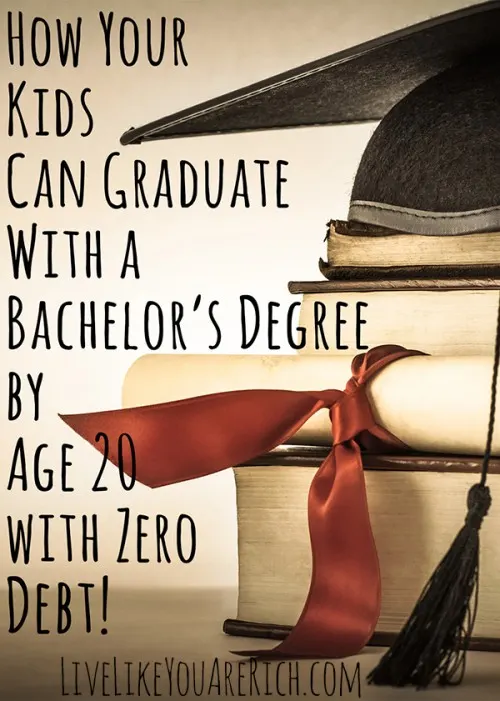To secure a successful future, education is vital. Yet, degrees take an average of five years and thousands of dollars to attain.
I graduated with my Bachelor’s Degree from a highly-ranked University at 20 years old. My parents wanted us to work for and value our education; thus we were responsible for paying for ALL of it. Even paying for it myself, I had zero debt when I graduated.
Here are 7 steps on how to graduate at age 20 (or even before) with a Bachelors Degree and zero debt…
1- Aim to complete your associate’s degree while in high school. It is possible. I did it (shy of one credit) and many others I know have done it too.
2- Meet with counselors on both the high school and college level and make a plan. Triple check all credit requirements and make sure classes (if taken at different schools) transfer correctly.
3- Enlist in as many pertinent concurrent enrollment classes that your high school offers. Concurrent enrollment classes are college accredited classes that are offered at the high school level. They typically count as both high school and college credits. For example, I took Math 1010 and Math 1050 in high school. They counted for my high school math credits as well as the math requirements for my associate’s degree. Further, concurrent enrollment courses are typically very inexpensive and are taken during regular school hours during high school.
4- Take AP courses that you know you will pass. It’s devastating to study for a complete year and then fail the test. Courses like AP Photography that are based on a portfolio and cannot be failed due to one test are great as well.
5- Attend on-campus classes while you are in high school. I was on the high school tennis team so I enrolled in a college tennis class. It was awesome earning credits for the practice that I needed to do anyway. I also took a biology class on the campus and learned a lot. If you do not live close to a university look for online courses. I completed 4 online courses while in high school. Some were offered at the high school and we could go to the class and watch our professor miles away on a screen, others I paid for an took on my own. The internet has made going to college and completing college courses younger much easier.
Don’t be intimidated to go to school on campus. I got great grades by studying well despite testing against older classmates. I also took courses during my last summer semester. I found that summer courses were easier and shorter than other semesters. I wished I had taken more summer courses when I realized this.
6- Find and apply for multiple scholarships. I was on track to earn a very high value scholarship. Had I not been one credit short of my associate’s (due to an unfortunate misunderstanding), I would have received it. Yet, despite NOT getting this high value scholarship, I was STILL able to graduate with a bachelor’s degree with zero debt. But it would have been a lot easier to do with a scholarship. Spend hours researching and applying for scholarships. And as my mother would say, “Don’t put all your eggs in one basket”. Apply to many scholarships just in case the one you are counting on falls through.
7- Earn your way through school. I paid tuition on a monthly payment plan so I could use my weekly paychecks. Also, save up your money during the times you aren’t at school. Between high school and moving away for college I worked very hard and saved up enough to pay for the next year of school. During the next two years, I worked during school and was able to pay for my schooling before the end of my final semester. Here are 9 additional Ways to get a degree without going into debt.
Despite losing out on a high value scholarship and having to pay for every penny of the degree, I was proud to have been able to get my Bachelors Degree without going into debt. I valued my education much more than I would have had my parents paid for it. I also took my grades very seriously because I didn’t want to pay another couple hundred dollars to re-take a course or be forced to go to school an extra semester. Because of the valuable lessons I learned, my own children will be responsible to pay for the majority of their education.
Just to show that anyone can do this, at age 19 I took a 5 month break from college to travel to Taiwan (to teach English) and to New Zealand (to snowboard). I financed these trips as well as made money while abroad but when I came back I was broke. I had to work a few low key jobs (that allowed me to study) to get through my last couple semesters. If you (or your kids) don’t take a 5 month travel abroad trip they may be able to graduate even sooner than I did.
Following the aforementioned tips, I was able to graduate from a University with a four year degree at age 20 with zero debt. By using these 7 tips your children can too.
Check out these related posts: 9 Ways to Get a Degree Without Going into Debt, How to Avoid Debt, How to Get Out of Debt, and The Difference Between Good and Bad Debt.
For other rich living and money saving tips, please subscribe, like me on Facebook, and follow me on Pinterest and Instagram.

SUBSCRIBE FOR OUR EMAILS



Anna
Monday 20th of February 2023
I know this is quite an old post - but it has lots of good info. Thank you. I'm wondering, when you say you "Paid for college" - does that include room & board & transportation? Or were your parents taking care of those expenses while you paid tuition & books? thanks.
Anita
Wednesday 15th of March 2023
When I was in High school they let me continue living at their home ie. stay and eat for free. Once I left for college I paid for everything. They didn't pay for anything—except I think my phone and car insurance since I was still on the family plan. I paid for my rent, food, clothing, transportation/gas, tuition, books, etc.
Lexa Werner
Sunday 15th of November 2015
Anita- I don't know if anyone has mentioned this yet but in the state of Minnesota the state will pay for you to take up to 18 credits a semester at any college in the state your junior and senior year of high school. I am currently a junior and I will be graduating with my Associate's degree in the Arts from the local tech school when I graduate high school. This can also be used as a "transfer degree" to go to a 4 year school once you graduate. I am SO happy I chose to go this route, and even more so after reading your post. Thanks for sharing!
Anita Fowler
Monday 16th of November 2015
Thank you for this information. Many will find it helpful!
Lexa Werner
Sunday 15th of November 2015
And also I got my CNA license as soon as I turned 16. A local nursing home hired me and paid FOR my training and CNA test, and paid me TO go through the training. I am currently making about double what other teens are making at fast food restaurants and other minimum wage jobs, and it's something that any nursing home in the country would hire me. I highly recommend teens who can handle the work that it is (aka wiping butts) to get their CNA licensing as it will pay MUCH better than lots of jobs you could get to help put you through college.
TP
Sunday 1st of November 2015
Good advice, but don't assume ALL of it will work for everyone.
Yes, many students can earn an associate's degree while they're still in high school -- but it requires that you're at least a strong-average student, and it generally requires that you have your own transportation to the community college.
Working on an associate's degree in high school also takes away your opportunity to take some really great electives in high school: J-ROTC classes, for example. Or the classes that lead to a certificate in cosmetology or a CNA license. Before you decide to fast-track to the associate's degree, be sure you understand what you're giving up.
Keep in mind, too, that your high school only has X number of spots for students to take these dual enrollment high school /community college classes that lead to an associate's degree. So not everyone can get in!
Once you have the associate's degree, do not assume that EVERY major can be completed in two more years. This especially true for people majoring in nursing and teaching because they're required to spend so much time in clinicals and student teaching. It's also true of engineers and people in techy-majors because they often take on internships.
Of course, the biggest reason most people won't do this is that they don't plan. Or, they don't plan that far in advance. If you decide at the end of junior year that you want to do this ... it's probably too late to get everything in. It's a rare person who's going to see these options as a freshman or sophomore -- and really, that's when you'd have to start this process.
The bottom line: Earn some credits towards college while you're still in high school, but don't do it at the expenses of the great classes you can ONLY take while you're in high school, and don't beat yourself up if you don't manage this feat. Graduating at 22 is pretty typical (most people are 18 at high school graduation), so don't feel that you're a loser if you don't meet this standard!
Anita Fowler
Wednesday 4th of November 2015
Good tips. I agree with them all. But this is a great option for those who do see fit to give it a try.
Amy
Thursday 23rd of July 2015
I have a couple questions, first are students allowed to be enrolled in high school and community college/online college at the same time? Or do you need to do college and online courses over summer months? Secondly not everyone is allowed to take AP or college credit courses at our high school. You have to be approved by teachers and accepted and actually they only allow the top 10% of students to participate. Is this not the norm around the country?
15 Most Popular Money Saving Articles of 2015 - Sarah Titus
Monday 20th of July 2015
[…] How to Get a Bachelor’s Degree by Age 20 With Zero Debt {Live Like You Are Rich} […]